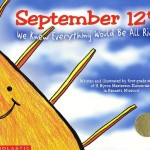As we are winding down our school year, here are some fun ideas to try this summer:
Language and Literacy:
Talk and listen– take time to talk to your child during a trip in the car, a walk to the park, or even a day at the beach. Your child has so many interesting things to say! Stretch your child’s thought process and expressive language by asking “Why?” “How do you know that?” and “Tell me more about that.” Encourage your child’s imaginative thinking by asking “What if?” questions.
Read, Read, Read– Go to the library! There are many great programs ongoing this summer and a wonderful summer reading program with lots of incentives for kids to read. Encourage your child to use their reading strategies:
Preview the book together. Look through all the pictures and talk about what’s happening.
Point out sight words (words we know by heart).
Point to the words- although many children are beginning to “outgrow” this strategy, having them point to the words helps children focus on the print and make sure they are reading what they see.
Look at the pictures- if your child gets stuck on a word, they can use picture clues to help figure out the word.
Get your mouth ready- this means that your child should be looking at the first letter of the word and have their mouth/lips formed to make that sound.
Does it look right? This is to help your child self monitor her reading. If the word is “dog” and s/he reads “puppy,” this question will help cue your child in to look more closely at the word and read the correct word.
Does it make sense? Another strategy for your child to self monitor his reading.
Read on and then go back- if your child gets stuck on a word and cannot figure it out, encourage her to keep reading and then go back and reread to see if she can now get the word. This will help your child to get an idea of what may make sense in the sentence.
Read, reread. and keep rereading- rereading helps develop fluency, accuracy and comprehension. After your child is comfortable with the story, ask questions about the story, or have your child write and/or draw about the story. You can ask basic retelling questions like “What happened?” “Where did the story take place?” “What was the problem/solution in the story?” and then stretch your child’s thinking with deeper questions like “Why do you like the main character?” “How are you like/unlike the character?” “What would happen if…?” For non fiction, ask “What new thing did you learn?” “How do you know that?” “What do you want to find out?”
Write– Have your child write letters, grocery lists, notes, journals, stories, or even emails. Just remember that, as with reading, children will progress at different rates with their writing skills. Please provide many opportunities for your child to write every day. Here is a list of skills for children to work on as they progress to first grade:
Writing is organized from left to right, top to bottom, and is legible
Applies letter/sound knowledge to writing
Uses vowels in writing
Uses uppercase letters and lowercase letter where appropriate
Remembers punctuation and spaces between words
Is able to read own writing
Writes in complete sentences that make sense
Generates original ideas for writing
Uses details in writing (ex: “I see a dog” vs. “I see a little black dog”)
Varies sentence structure and complexity (ex: “I like ice cream” vs. “Ice cream is my favorite dessert because…”)
Experiments with word choice (ex: “The cake is good” vs. “The cake is delicious”)
Mathematics– opportunities to reinforce math concepts will arise naturally every day (sorting laundry, counting toys, patterning breakfast cereal, or even measuring when cooking). Here are some ideas to get you started:
Keep track of activities on the calendar. Count how many more days until a family event or vacation.
Measure and record how tall you child is at the beginning and end of the summer. Compare the two and see how much he has grown.
Cook together: Cooking involves reading numbers, counting, measuring ingredients, measuring time and sequencing
Read and follow maps at museums and zoos
Go on a number hunt- the mailbox, telephones, book pages, gas pumps, etc.
Create and solve number problems with family members.
And here are some more ideas to try:
Kindergarten Summer Fun Activities
parent activity booklet
Sidewalk Games
30 Fun Things to do with kids this summer
Kick off your summer with a backyard campout. On June 28, 2014, Be Out There will be having their Great American Camp Out. It’s free and fun! Find out more here: http://www.nwf.org/Great-American-Backyard-Campout.aspx
Check out 27 creative and inexpensive ways to keep kids busy: http://www.buzzfeed.com/alannaokun/creative-and-inexpensive-ways-to-keep-kids-busy?sub=2244394_1197863









 Booklists from the Brooklyn Public Library:
Booklists from the Brooklyn Public Library: 
